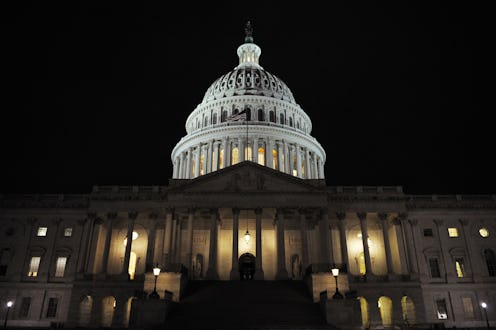News
Why The EACH Woman Act Is Vital To Our Nation
Illinois Congresswoman Jan Schakowsky understood how much damage the Hyde Amendment was inflicting upon women when she heard a heartbreaking story about a woman who went through hell and back because of the law. A doctor once shared with Schakowsky a story of a pregnant patient on Medicaid who had sickle cell anemia. The patient wanted to get an abortion, but couldn't, because the Hyde Amendment blocks federal funding from being used on abortion services. As the patient tried to assemble the money to pay for one on her own, she became sick enough that the pregnancy was threatening her life. Medicaid finally agreed to pay. And after the procedure, the woman talked about how lucky she was.
"This woman wept with happiness that she had finally been sick enough that Medicaid had covered her abortion and she finally regained control of her life," Schakowsky says. The patient shared with the doctor that she had a pregnant friend who was also on Medicaid, but she was not ill, so there was no chance it would cover her abortion.
"So, to think that she was the 'lucky' one," Schakowsky scoffs. "Her pregnancy was threatening her life, and she was able to obtain an abortion. These are the lengths that women have to go through just to control their bodies."
As almost every woman in the United States knows, our country has a pretty awful reputation when it comes to abortion rights. Back in 1976, the Hyde Amendment was approved, which means that for the past 40 years, the United States has been blocking federal Medicaid from funding most abortions. For the last 22 of those years, limited exceptions have been made for women whose pregnancy would endanger her life and when the pregnancy is the result of rape or incest. But these exceptions are not enough. And that's why three congresswomen have introduced the EACH Woman Act, which would ensure abortion coverage for all women on Medicaid, regardless of income.
The EACH Woman Act, which stands for Equal Action to Abortion Coverage in Health Insurance, would give abortion coverage to women who are enrolled in a government health insurance plan or government-managed health insurance program, or who receive health care from a government provider, according to the All* Above All website. The All* Above All campaign was the first national effort created to end the Hyde Amendment.
In 2015, Schakowsky, Rep. Barbara Lee, and Rep. Diana DeGette introduced the EACH Woman Act. Lee tells Bustle that the act is crucial because elected officials should not be involved in women's private health decisions. The act would be a big step in distancing federal decision-making on behalf of women when it comes to their bodies, yet so far, the act hasn't gained enough traction to pass. But in this historic election cycle where a woman has been named a major party candidate, the group finally has a ally in Democratic nominee Hillary Clinton, who is also committed to abolishing Hyde.
For Lee, the repeal of Hyde is a long time coming. "Forty years ago, nearly to the day, I was working in the office of Congressman Ron Dellums when the Hyde Amendment was first attached to the federal budget," she tells Bustle. "It was a different time. I was one of only a handful of women, especially African-American women, working on Capitol Hill. While we lost the battle to reject Hyde, I knew that one day we would end this discriminatory ban. That day is closer than ever before."
The EACH Woman Act would help level the field for low-income women to get the abortion coverage they may need. In order to enact change, more people need to hear the stories of women who could benefit from the act, to show the challenges it causes for women who need the care but can't afford it.
Despite some advances in abortion rights (like June's defeat of HB2 in Whole Women's Health v. Hellerstedt, where the Supreme Court ruled that the burdens placed on abortion providers through the bill were too heavy to bear), we've still got a long way to go.
"[Whole Women's Health] was a monumental step in the right direction," Schakowsky says, "but now we're going to need to systematically take down laws around admitting privileges, ambulatory surgical center requirements in other places, and the hundreds of bills that have been passed at the state level that require mandatory waiting periods and doctors providing patients with inaccurate information."
Fortunately, there are groups of people banning together who are working to spread the word about these unfair requirements.
So what are the next steps in getting the act to pass? According to Lee, gathering support. "The best thing you can do is to go to Congress and ask them to sign on as co-sponsors — the more co-sponsors you get, the more momentum you get," Lee says.
It's so important to gather the numbers to repeal Hyde and support the EACH Women Act in order to assure every woman's right to an abortion that she can afford. Without the funding needed for women to access abortions, the government is restricting women's rights to control their own bodies, and that has to be changed.
